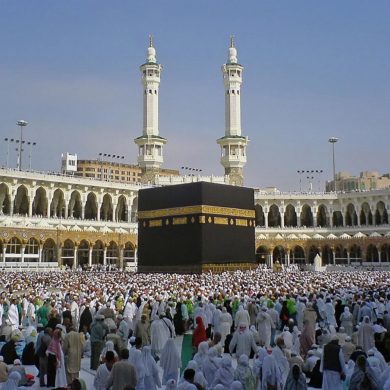What is the first thing that comes to your mind when you think of human rights and humanitarian initiatives? You probably didn’t think of the Oath of Brotherhood; an under-appreciated yet revolutionary event that transformed society at it’s time, and has the potential to transform society today. So, what is the Oath of Brotherhood? And how did this event change history? Read on to find out.
Background
Prophet Muhammad (saw) grew up in his beloved city of Makkah, and began to call for the message of Islam in this land. However, he was faced with hatred, arrogance, ignorance and oppression from the tribe of Quraysh, who made life as a Muslim living in Makkah exceedingly difficult as the years went by. As a result of the unbearable oppression, the Prophet and a group of Muslims of Makkah (the muhajiryn) migrated to Madina (al-Madina al-Mūnuwwara)1. This meant leaving their houses, belongings, families, jobs, and the land they call home. Expectedly, this move was physically and psychologically exhausting, but the muhajiryn had such resilient faith in Allah (swt) that they were prepared to sacrifice absolutely everything for the sake of protecting Islam.
After a tiring journey, the muhajiryn arrived to the new land of Madina. They had left everything behind and knew no one in Madina, and had to build a new life from scratch – a feeling every refugee or immigrant knows can be very challenging and mentally defeating. After the warm welcome the Muslims received from the people of Madina (called the ansār, the supporters), the Prophet established al-masjid al-nabawwy, where he is buried today. The first thing Prophet Muhammad did once the mosque was completed, was to order for what is called the Oath of Brotherhood (عهد المؤاخاة/ ‘ahd al-mu’akhāat), made on 12th Ramadan 1AH2.
Significance of the Oath of Brotherhood
The Oath of Brotherhood implemented by the Prophet was simple, yet revolutionary. The oath basically required each of the muhajiryn to be paired with a resident of Madina. The ansāri was made to share everything with the muhajir (singular of muhajiryn) that he is paired with. This includes their wealth and income, house, jobs, food, and according to some narrations even become their inheritors once they pass away! Put simply, each of the muhajiryn became part of the family to which they were appointed by the Prophet3. In fact, it is called the Oath of Brotherhood because the people of Madina were ordered to take a Muslim of Makkah as their brother, therefore giving them all the rights of an actual brother in terms of psychological support, money and the sense of brotherhood in all other aspects of life.
Allah (swt) praised this brotherhood and eternalised it in the Qur’an4:
وَالَّذِينَ تَبَوَّءُوا الدَّارَ وَالْإِيمَانَ مِن قَبْلِهِمْ يُحِبُّونَ مَنْ هَاجَرَ إِلَيْهِمْ وَلَا يَجِدُونَ فِي صُدُورِهِمْ حَاجَةً مِّمَّا أُوتُوا وَيُؤْثِرُونَ عَلَىٰ أَنفُسِهِمْ وَلَوْ كَانَ بِهِمْ خَصَاصَةٌ ۚ وَمَن يُوقَ شُحَّ نَفْسِهِ فَأُولَٰئِكَ هُمُ الْمُفْلِحُونَ
And [also for] those who were settled in al-Madina and [adopted] the faith before the former ones (arrived in al-Madina), who have love for those who emigrated to them and feel in their hearts any ambition for what the emigrants were given but give [them] preference over themselves, even though they are in poverty. And whoever is protected from the stinginess of his soul – it is those who will be the successful.
What made this newly established brotherhood so profound and revolutionary was that, prior to Islam, the tribes of Madina and of Makkah were engaged in constant conflicts and even considered each other enemies. Yet, when their hearts were purified with the message of Islam, they became united on the basis of their shared beliefs and faith in Allah (swt). This was even to the extent that the ansāri would become upset if the Prophet didn’t chose them to take a muhajir as a brother and they all competed to treat their new brothers in the best way possible and offer them as much of their love, wealth and support as they could. As Dawud al-Attar describes in his book mujaz ‘ulūm al-qur’an, the noble stand of the ansār with the muhajiryn is the ultimate example of how the Qur’an was able to produce a deep practical and internal change in society; it transformed enmity into brotherhood, and converted people who would have been destined to enter hellfire, to become amongst the righteous of Jannah5.
The muhajiryn left everything behind, including their families, to migrate to Madina where they could safely practice Islam. Thanks to this brotherhood, which outdid biological brotherhood, all the life expenses, accommodation issues and homesickness which they suffered from were solved. Most importantly, they developed a spiritual brotherhood with each other which created a robust Muslim society that could not be defeated. It instilled the habit to care for one another and for all of society, and to treat everyone as though they are part of their own family.
This beautiful show of unity and humanitarianism is something we don’t see everyday. As eloquently explained by IslamWeb:
“If the Holy Qur’an had not mentioned the story of brotherhood that occurred between the muhajiryn and the ansār, or if there had been no reliable hadiths and historical witnesses to confirm the incident, we would have said that the story is only imaginary, because the scenes of this event transcended all expectations, and converted the world of theories and examples into practice and into reality. Through this occasion the companions presented an amazing show of sacrifice and selflessness in a way that had never occurred before by any nation in history, and that is what makes it necessary for us to analyse this event and to take lessons from it.” 6
Lessons for the Muslim Ummah – and for the world
The profound Oath of Brotherhood between the ansār of Madina and the muhajiryn from Makkah is an event like no other in all of history, and there are countless lessons that we can derive from it.
1.Unity and brotherhood are central to Islam
This event shows how the Muslim Ummah is one; our small disagreements and differences are petty compared to our substantial common belief in Allah (swt) and His messenger. Allah (swt) emphasises this in the Qur’an7:
وَإِنَّ هَٰذِهِ أُمَّتُكُمْ أُمَّةً وَاحِدَةً وَأَنَا رَبُّكُمْ فَاتَّقُونِ
And indeed this, your ummah, is one ummah, and I am your Lord, so fear Me.
The ansār and muhajiryn had so many differences which they could have used as an excuse against helping the newly immigrated Muslims, but they put them aside and unified their hearts. Muslims must always stand with each other as this forms the basis for a strong society. It is narrated that the Prophet Muhammad said:
المؤمن للمؤمن كالبنيان المرصوص يشد بعضه بعضا ويقوي بعضه بعضا
A believer is to another believer like a sturdy building; they pull each other together and strengthen one another.
2. Islam is the religion of humanity and human rights
As Muslims, our main source of inspiration should be from our all-encompassing religion. We don’t need to find inspiration from global ‘human’s rights’ organisations which may have flawed systems that are based on personal and political gain, rather than the wellbeing of humanity. Islam is a divine system designed by the Perfect, Allah (swt), and if we want to find any solution to a human rights issue we will find it in Islam. The example of the Oath of Brotherhood is the best example of this. In today’s terms, the muhajiryn were refugees – they faced persecution and were therefore compelled to leave their homelands to find somewhere new where they could have safety while practicing the religion of Islam.
Although the circumstances of the muhajiryn differ from those today, there are many lessons we can take to improve the way we deal with humanitarian crises. In our societies today, asylum seekers and refugees are tormented and placed in detention centres, uncertain of their future. If they survive the perilous journey and are eventually granted residency, they need years of hard work and personal struggle to get over not only the financial and material struggles, but more so the psychological ones. Refugees often suffer the pain of being considered ‘different’, and marginalised from mainstream society. Not only this, but it takes years to adjust to a new environment, system and society. The muhajiryn did not have to experience this struggle owing to the momentous Oath of Brotherhood established by Prophet Muhammad. This move made the muhajiryn blend into society and there was no difference between them and the locals, the ansār. The ansār showed a level of selflessness that is unparalleled in history. You may think what the ansār did was not a big deal, but imagine yourself in this situation. You are inviting a stranger to live with you in your home, giving them your money, your food and your constant care and support. You treat them like they are actually part of your family, sharing with them everything you have. And, you expect nothing in return. How many of us would tolerate this?
So, let’s make an oath to stand strong as a united Muslim Ummah, put our differences aside, and be proud of our Muslim identity. Islam has the solution to every problem and there is no humanitarian system that can even come close to it. Let us be proud to carry the honourable title of ‘Muslim’, and believe that if we truly follow Allah (swt) and His messenger, we will become the best society to walk the earth with our justice and humanity.
Notes
- The migration or hijra of the Meccan Muslims is the event that marks the start of the hijri We are currently in 1441AH (after hijra), which means it has been 1441 years since this hijra of the Prophet and Muslims to Madina.
- Bayynat (Arabic), Ramadan: http://arabic.bayynat.org/HtmlSecondary.aspx?id=3280
- al-Balāgh 1998. Nafahāt min al-Sira (Arabic), al-Balāgh Foundation, Tehran, p.26.
- Quran 23:9
- Al-Attar, D 2011. mujaz ‘ulūm al-qur’an (Arabic), dār al-Nada, San’aa, p. 101.
- Translated from Islam Web: https://www.islamweb.net/ar/article/13431/
- Qur’an 23:52






